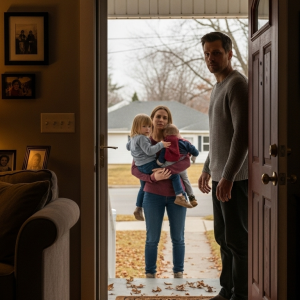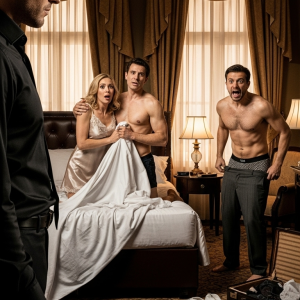I was diagnosed with epilepsy at a young age. As if that wasn’t enough, by the age of eight, I also carried the labels of dyslexia and severe ADHD. My parents, emotionally and mentally unequipped for a special needs child, had expected another perfectly healthy son like my older brother. Instead, they got me.
They made sure I felt like a burden. My childhood was not defined by my illnesses, but by their reaction to them. They treated me like a pariah in my own home. When I’d walk into a room, conversations would cease, the life sucked out of the space by my mere presence. They walked on eggshells around me, sighed with disappointment, and their most common piece of advice was for me to just “be normal.”
This constant feeling of being unwanted, combined with adolescent hormones, created a perfect storm. I started acting out. I flunked classes on purpose, became defiant, disobedient, and rude. I was pushing everyone away because I was miserable and desperate for my parents to pay any kind of attention to me. Even then, they didn’t seem to care. They’d be summoned to the school, and instead of reprimanding me, they would just offer excuses that I wasn’t “right in the head.” It was humiliating.
Then, when I was 14, I finally broke them. I brought a pack of cigarettes to school and lit one up right in the middle of class. When the teacher told me to get out, I flipped him off.
That was the last straw. I was expelled, and for the first time, my parents were actually furious. They tore into me that day, and the things they said, I will never forget.
“We regret ever having you,” my father’s voice was cold steel. “If we had known you would turn out to be such a psychotic little kid, we would have terminated the pregnancy.”
They called me a burden on the family and said they were better off with just one son. Then, they locked me in my room for a week. My meals were sent up. I was a prisoner, not for a crime I had committed, but for being the child they never wanted.
After a week of solitary confinement, my parents told me to get in the car. My mom and brother packed my things. As we drove a familiar route, I realized we were heading to my grandmother’s house—my dad’s mom. I thought maybe it was a temporary arrangement, a couple of weeks for me to get my head straight with a strict disciplinarian who also had a soft spot for me.
I was wrong. This was not temporary. This was permanent. They were dumping me.
When we arrived, they left all my things on the doorstep. They told me this was my new home and that they wanted no contact with me ever again. In front of my grandmother, they said it.
“We don’t want a freak like you living with us anymore,” my mom said, her voice devoid of emotion. “We want to focus on our very normal son.”
Hearing them use the same word the bullies at school used for me—freak—was the moment something inside me broke for good. The desperate 14-year-old who had been begging them not to leave just seconds before vanished. I realized they were the biggest bullies in my life, and that by leaving me here, they were actually doing me a favor. I stopped begging. I accepted my fate.
Once they left, my grandmother and I had a long, honest conversation. She admitted she had been hesitant. At her age, a widow with not much of her own, she wasn’t sure she could handle a troubled kid. But after my father told her he had locked me in my room for a week, she knew he was not the right parent for me.
“I’m sorry for not intervening before,” she told me, her eyes full of a kindness I hadn’t seen in years. “But we’re going to have a fresh start. We’ll do right by you.”
And that’s what we did. With her help, I turned my life around. She got me tutors, enrolled me in a private school that catered to my needs, and provided the space I needed to excel. She didn’t use my conditions as an excuse, but as a reason to provide me with the help I needed. I graduated with a good score and went to college. For that, I only have her to thank.
My parents visited her occasionally, but I always made sure to be out of the house. They never asked for me. Eventually, my grandma had a huge fight with them over their neglect and told them never to come back. They were too proud to apologize, too proud to admit they had failed me. So, for almost ten years, we pretended the other didn’t exist.
A couple of months ago, my grandmother passed away. She was my rock, my entire support system, and the loss was devastating. Not even six months have passed, and my parents are already at my door.
I decided to talk to them, thinking perhaps they were here to finally apologize. After a bit of small talk and hollow condolences, they got straight to the point. My brother, their “perfect” son, had developed a drug habit in college and was now in serious trouble. They needed money for an expensive residential rehab program.
They knew my grandmother was well-off. They knew she had left her entire estate to me.
I told them I was ready to help, but on one condition.
“You will have to publicly acknowledge everything you’ve done,” I said, my voice steady. “The way you treated me, the things you said, the way you abandoned me, and the way you treated my grandmother. You will acknowledge why you need my help, so everyone will know the truth. This is her money we are talking about. If you want it, you have to earn it.”
Their faces fell. They called me unreasonable, selfish, heartless.
“You shouldn’t have expected anything from me at all,” I replied, “given that we haven’t spoken in ten years. This is my condition. Take it or leave it.”
They left, after a storm of tears and accusations, but I did not budge.
For the next week, my parents resorted to a new tactic: a guilt-trip campaign. They started sending me photos of my brother. He looked terrible, pathetic. This is the guy who needs your help, their messages read. You should really step up.
To that, I had only one thought: Where were you when I needed that kind of help? I was lucky my grandmother had my back. My brother’s fate now rested on our parents’ pride. What was more important to them: their egos, or the son they claimed to love?
Ten days later, they showed up at my place again. This time, they brought my brother with them, using him as a pathetic prop.
“You cannot do this,” I told them at the door. “This behavior is only damaging your chances. What you’re doing to him right now is dehumanizing.”
They refused to leave, telling me I had to promise to help them. I told them I would be making no promises, and if they didn’t leave, I would call the police. That scared them. As they left, my dad turned to me.
“You and your grandmother are the most selfish people on the planet,” he spat. This, coming from the man who dumped his special needs child on his elderly mother’s doorstep.
After that, I blocked them. I moved to a better apartment in a new neighborhood and told my relatives not to give them my address. It was clear their pride would always come before anything else, even the son they supposedly cherished. They couldn’t make one small sacrifice—a public admission of their mistakes—to save him.
They can keep their beliefs, their perfect image. And I’m going to keep my inheritance.Fair enough.
It’s been three months since I last saw them at my door.
Three months of silence—blessed, undisturbed silence.
At first, I half-expected some dramatic stunt. My parents had a flair for turning everything into a stage performance: maybe a sob story posted on Facebook, or some smear campaign to paint me as the “ungrateful” child. But nothing came.
I should have been relieved. Instead, it felt… unfinished. Like there was one last thing left to be said, not for them, but for me.
The chance came unexpectedly.
I was visiting my grandmother’s grave on a quiet Sunday morning. The cemetery was empty except for one couple standing by the far wall. I recognized them instantly, even from behind—the slight stoop of my father’s shoulders, my mother’s impeccable posture.
They were standing in front of a plot I didn’t recognize. When they turned and saw me, the flicker of shock on their faces gave way to something more guarded. My father muttered something to my mother and started walking away. She stayed.
We stood there in silence for a long moment. Then, she said, “Your brother is in county jail. Possession charges. They wouldn’t take him at the rehab without payment upfront.”
I let the information hang in the air. My instinct was to feel bad for him, but I reminded myself—this was their mess to fix, not mine.
“Why are you telling me this?” I asked evenly.
“Because you’re his brother,” she said. “Because you have the means. And because, deep down, you’re not as cold as you want to be.”
I almost laughed. “Cold?” I said. “No, Mom. Cold was locking your kid in his bedroom for a week because you regretted having him. Cold was leaving me on Grandma’s doorstep and saying you never wanted to see me again. Cold was not showing up for a decade while the only parent I had was dying in front of me.”
She opened her mouth to respond, but I held up a hand. “I have one last thing to say to you, and then we’re done.”
Her eyes narrowed, but she didn’t move.
“You made me believe, for years, that I was a mistake,” I said. “Grandma taught me I wasn’t. She taught me that I was worth loving, worth protecting, worth investing in. She gave me the tools to build a life. You and Dad? You had the same chance, and you threw it away. You chose pride over love. Over and over.”
She didn’t cry. She didn’t apologize. She just looked away. That told me everything.
That afternoon, I wrote a letter. Not to send—just to keep for myself.
It said: I release you. I release myself from waiting for the apology that will never come, from trying to prove I deserved to be kept, from the invisible leash of your approval. I am free.
I burned it in a little ceramic bowl on my balcony. The ash blew away with the wind.
Since then, I’ve been busy. My company—funded entirely by the inheritance—has taken off faster than I expected. I hired my first two employees last month. Every time I sign a paycheck, I think of my grandmother, of the way she’d clap her hands and say, “Make me proud, kiddo.”
I’ve built a home that feels nothing like the one I grew up in. There’s warmth in the walls, not tension. There’s laughter in the kitchen, not sighs of disappointment. My friends drop by unannounced, and I’m happy to see them every time.
Sometimes I still catch myself wondering if my parents will try one more time—maybe when my brother gets out of jail, maybe when they hear my business is thriving. But here’s the thing: I’m not scared of it anymore.
Because now, I know the answer. And it will always be the same.
Last week, I found an old photo album in one of Grandma’s storage boxes I’d been meaning to go through. Tucked inside was a picture of her holding me on my first day at the private school she’d fought so hard to get me into. She was beaming. I was grinning, missing two front teeth.
On the back, in her handwriting, were the words: The start of something good.
She was right.
And I’ll be damned if I let anyone—especially the people who gave up on me—take that away.




